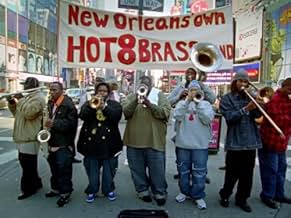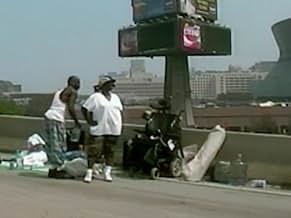Cuando se rompieron los diques: Réquiem en cuatro actos
Título original: When the Levees Broke: A Requiem in Four Acts
CALIFICACIÓN DE IMDb
8.5/10
5 k
TU CALIFICACIÓN
Un examen de la respuesta del gobierno de los Estados Unidos al huracán Katrina.Un examen de la respuesta del gobierno de los Estados Unidos al huracán Katrina.Un examen de la respuesta del gobierno de los Estados Unidos al huracán Katrina.
- Ganó 3 premios Primetime Emmy
- 8 premios ganados y 9 nominaciones en total
Explorar episodios
Opiniones destacadas
A requiem is a service intended to express the emotions and beliefs of the survivors at the death of a loved one. A requiem is not an autopsy to determine the cause of death, and if Spike Lee intended a requiem, I think he has succeeded. Criticism that this film is not analytical and precise is actually a complaint that this was not an autopsy--but none was intended.
One day a documentary may be made which closely follows the chronology of the storm and the failure of the levees. A documentary may more closely focus on the devastation of the Mississippi Gulf Coast, and the equally shameful failure of government to deal with the problem there. A documentary may be made which focuses on how daily life has changed for those of us who survived. I don't think Spike Lee intended to cover all of those points. The points he did address were very well presented.
The film is outstanding at communicating the grief, suffering and frustrations of the persons shown in the film. It is a very moving expression of emotion and belief, which is the purpose of a requiem.
I don't think the lack of government response is simply and solely attributable to racism, but that may be because I am white. In the film, that opinion was frequently expressed, but I also note that there were also some opinions expressed about the levees being intentionally dynamited. I think Spike Lee undercut the impact of his major premise by including a rumor that seems similar to the myths of Bigfoot or Elvis being alive.
I think the gross government ineptitude, inertia and political games are all well-documented, and the bottom line is that those persons who were financially able to take care of themselves fared better than those who were not--it's a matter of class and wealth, and not so much a matter of race.
In yesterday's news, it was noted that Congress earlier appropriated $17 billion to build new houses in the affected areas, and that as of this date (August 22, 2006), not a single house has been built with that money in either Louisiana or Mississippi.
One day a documentary may be made which closely follows the chronology of the storm and the failure of the levees. A documentary may more closely focus on the devastation of the Mississippi Gulf Coast, and the equally shameful failure of government to deal with the problem there. A documentary may be made which focuses on how daily life has changed for those of us who survived. I don't think Spike Lee intended to cover all of those points. The points he did address were very well presented.
The film is outstanding at communicating the grief, suffering and frustrations of the persons shown in the film. It is a very moving expression of emotion and belief, which is the purpose of a requiem.
I don't think the lack of government response is simply and solely attributable to racism, but that may be because I am white. In the film, that opinion was frequently expressed, but I also note that there were also some opinions expressed about the levees being intentionally dynamited. I think Spike Lee undercut the impact of his major premise by including a rumor that seems similar to the myths of Bigfoot or Elvis being alive.
I think the gross government ineptitude, inertia and political games are all well-documented, and the bottom line is that those persons who were financially able to take care of themselves fared better than those who were not--it's a matter of class and wealth, and not so much a matter of race.
In yesterday's news, it was noted that Congress earlier appropriated $17 billion to build new houses in the affected areas, and that as of this date (August 22, 2006), not a single house has been built with that money in either Louisiana or Mississippi.
10khereth
By far and away the best documentary on Katrina and what happened to the people of my home, New Orleans. It captures the anger, the despair, the fear, and the humanity of our country's greatest disaster. I still cry when I see my city under water. I cry even more knowing others did not receive equal assistance because of the color of their skin. I was concerned that Spike Lee would put his spin on this tragedy, but he has done the opposite. He allows citizens from all over the city, economic and racial backgrounds to tell the real story. He gives a fair and balanced perspective on how all levels of our government failed the people of New Olreans and a good portion of the Gulf Region. I only hope that Mr. Lee comes back in a few years to film another documentary, "The City New Orleanians Re-Built".
Thank you Spike and all the people at 40 Acres and a Mule for doing what had to be done - recording the real story. I see heaps of Emmys.
Thank you Spike and all the people at 40 Acres and a Mule for doing what had to be done - recording the real story. I see heaps of Emmys.
Spike Lee has made his most powerful work yet with "When The Levees Broke". It has only been one night and two hours, but this documentary has moved me in such a way. I lived to see this on television but nothing quite put me in the middle of this disaster than this documentary. In depth interviews with the mayor, governor and citizens of New Orleans and the Ninth Ward was so stripped down and raw, I couldn't do anything but weep. This is really the first motion picture or anything of that like to make me cry. I felt like I was there and experienced it. One thing that I applaud Spike for was keeping it real. Nothing was censored, which comes to no surprise because it's on HBO, but vivid portrayals of the environment such as dead bodies or backed up sewage, were shown and even when it wasn't you felt like you could see or smell it. The frustration of the people of New Orleans pierces your heart and you could do nothing but feel for them. In two hours, "When The Leeves Broke" taught me things and gave a lot of insight on the Hurricane Katrina fiasco. I eagerly await the final two hours.
10giatime
Let me explain this in terms everyone can understand. This is not an issue about Republican or Democrat, Left or Right. This is about justice. When a Government that is responsible for it's people turns it back on an entire State for immoral reasons someone needs to be accountable. This documentary explains in detail what happens when a government any government is not held accountable. There are no glass houses. Heed it's warning. One day it could be you floating down main street. Or burning up from global warming gone mad. This film is terrifying in the sense that it wasn't filmed in a Hollywood studio with some lame like Bruce Willis saving the day and all is well. This is real. And if you can stomach it, watch it. Invite a friend to watch it. And demand accountability from the people that are supposed to work for all of us. What does it say, when the richest country in the world lets it's most weak, sickest, poorest, young and old rot in a major city for over 7days? Watch this documentary and you answer that question yourself.
After seeing this movie, I feel completely betrayed by the United States government and the government of Louisiana. I am from a town right outside of New Orleans (on the Northshore of Lake Pontchatrain) and my town endured much devastation and many people lost their lives. I think that this movie is a great opportunity for Spike Lee to show everyone in the United States that Hurricane Katrina still haunts the lives that it affected 1 year ago, including myself. Many people do not understand the magnitude of this storm and until you smell it, see it in person, and live it YOU WILL NEVER UNDERSTAND. To see the vice president fishing, and Rice shopping in New York just days after the devastation is very unwelcoming but sometimes I believe that at one point, there was nothing that could be done because this country was not ready for a hurricane like this and they never did expect it. But indeed, this movie can give a person a slim sense of what we endured. THe graphics were horrible and very graphic but they were a good touch as to visual understanding of the situation. Many rumors are still circulating about this storm but in my opinion, they will never really get to the end of it. The storm is over and there is no turning back time so pointing fingers is a waste of time. I believe the government needs to focus on the future and the rebuilding process of New Orleans and the other areas who were severely devastated. I give this movie 2 thumbs up because having witnessed the devastation first hand I believe Spike Lee did an extraordinary job to create a documentary that covers all aspects of this storm.
¿Sabías que…?
- TriviaThe score for When the Levees Broke was re-used in the 2018 Spike Lee Joint BlackKklansman.
- ConexionesFeatured in 50 Documentaries to See Before You Die: Episode 1 (2011)
Selecciones populares
Inicia sesión para calificar y agrega a la lista de videos para obtener recomendaciones personalizadas
- How many seasons does When the Levees Broke: A Requiem in Four Acts have?Con tecnología de Alexa
Detalles
- Fecha de lanzamiento
- País de origen
- Sitio oficial
- Idioma
- También se conoce como
- When the Levees Broke: A Requiem in Four Acts
- Locaciones de filmación
- Productoras
- Ver más créditos de la compañía en IMDbPro
- Tiempo de ejecución51 minutos
- Color
- Mezcla de sonido
- Relación de aspecto
- 1.78 : 1
Contribuir a esta página
Sugiere una edición o agrega el contenido que falta

Principales brechas de datos
What is the Spanish language plot outline for Cuando se rompieron los diques: Réquiem en cuatro actos (2006)?
Responda






















